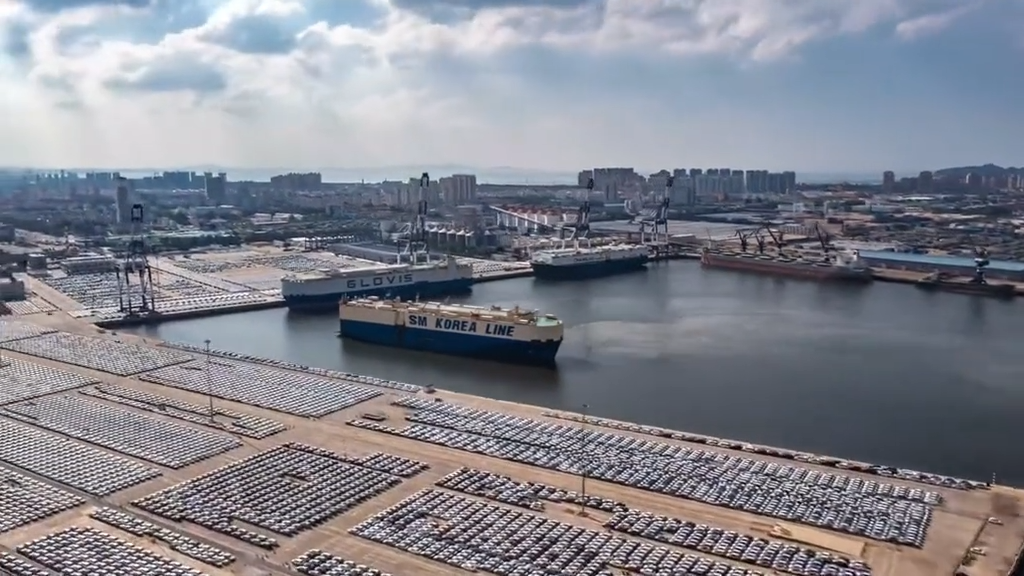2025-07-21 8:38:17
Recently, the Shanghai International Shipping Research Centre released the ‘Global Port Development Report (2023)’ shows that Yantai port 2023 completed 485 million tons of cargo throughput, an increase of 4.8% year-on-year, and successfully ranked among the world's top ten coastal ports throughput, and take a solid step forward in accelerating the world's first-class ports target.
In recent years, in the integrated development of Shandong port pattern, Yantai port based on the Bohai Sea facing Northeast Asia's international logistics hub centre, the Yellow River Basin land and sea multimodal intermodal transport gateway hub and other development positioning, comprehensively deepen the reform to promote high-quality development, amplify the function of the port logistics hub, unimpeded the domestic and international ‘double cycle’, 42 new routes It has opened 14 inland ports, maintained navigation and trade with more than 150 ports, and continuously empowered Yantai to build a port-type national logistics hub.

Yantai Port has integrated national strategies, superior policies and its own advantages, adjusted and optimised its business structure, established three major cargo source systems, namely pillar, support and brand, and found a development path of mismatch and synergy with distinctive development. The annual throughput of bauxite exceeds 120 million tonnes, ranking the first port of bauxite import in the world; the development of crude oil has become an important base for crude oil import and transshipment in northern China, and the cargo types of refined oil, chemicals and LPG have been growing in full volume. Container volume for three consecutive years to maintain double-digit growth, and actively build Japan and South Korea consumer goods distribution centre, all-round to build the Bohai Rim regional container hub for domestic trade, foreign trade containers, Japan and South Korea, the basic port of the near-ocean trunk lines and Qingdao Port ocean routes to feed the port. Seizing the development opportunities of ‘three new things’ and high-end equipment, the five special businesses of commercial vehicles, general cargo, two-way logistics golden corridor in China and Africa, mineral mixing and blending, and LNG have gained full momentum and become the ‘new engine’ of the world's first-class ports. It has become a ‘new engine’ for world-class ports. The service capacity of commercial vehicle business has been upgraded, and it has become the first port in China that integrates ro-ro, lifting, container and frame box transport modes, and the position of the third largest foreign trade export port continues to be solid, with the volume of international transshipment ranking first in the country; it has initiated the first multimodal intermodal development alliance of general cargo in China, opened 23 general cargo routes, and the volume of shipments has jumped up to the first square of the national ports; and the golden China-Africa bi-directional logistics corridor is linked to more than 20 countries and regions in Africa, and has steadily become the world's first port. The China-Africa Two-way Logistics Golden Channel connects more than 20 countries and regions in Africa, ranking the first port of bauxite ore in the world and the first port of trade with Africa; the crude oil blending mode is leading and the scale is the first in the country, and the volume of blended iron ore re-exported from Japan and South Korea and the volume of blended copper concentrate are the first in the country; the LNG tanker business has been selected as the ‘National Multi-Modal Transportation Demonstration Project’, and the volume of LNG tanker ship transport is the first in the country.
Relying on the integrated development platform of Shandong ports, Yantai Port focuses on building a ‘first-class supply chain integrated service system based on ports’, joining hands with sister ports and sector groups to promote ‘internal and external business integration, internal and external service integration, and the building of a supply chain integrated service platform’, promoting the traditional business of ports, and promoting the development of a supply chain integrated service platform. Yantai Port will work with its sister ports and sector groups to promote ‘internal and external business integration, internal and external service integration and the creation of a comprehensive supply chain service platform’, promote the in-depth integration and two-way empowerment of the port's traditional business and new businesses such as finance, logistics, trade, shipping and science and technology, and expand more business modes such as integrated services, joint marketing and the construction of multimodal transport corridors, so that Yantai Port's supply chain service products can be tailored to its customers, and set up a platform of resource aggregation for the development of the local economy.
Yantai Port has upgraded its port services with the development of new productivity and the construction of a smart green port, formulated a digital transformation plan and the ‘1+2+3+10+N’ implementation programme, and is committed to building three smart green demonstration ports for bulk liquid bulk, bulk dry bulk and commodity trucks, as well as two support platforms for digital control and supply chain integrated services. It has landed the world's first dry bulk cargo automated terminal, crude oil ‘smart brain’ and intelligent safe storage and transportation system and other industry-leading achievements, and the intelligent ro-ro project has been selected as one of the first batch of special pilot projects for a strong nation in transport, and a pilot project for the Ministry of Transportation and Communication's pilot application of intelligent transport.